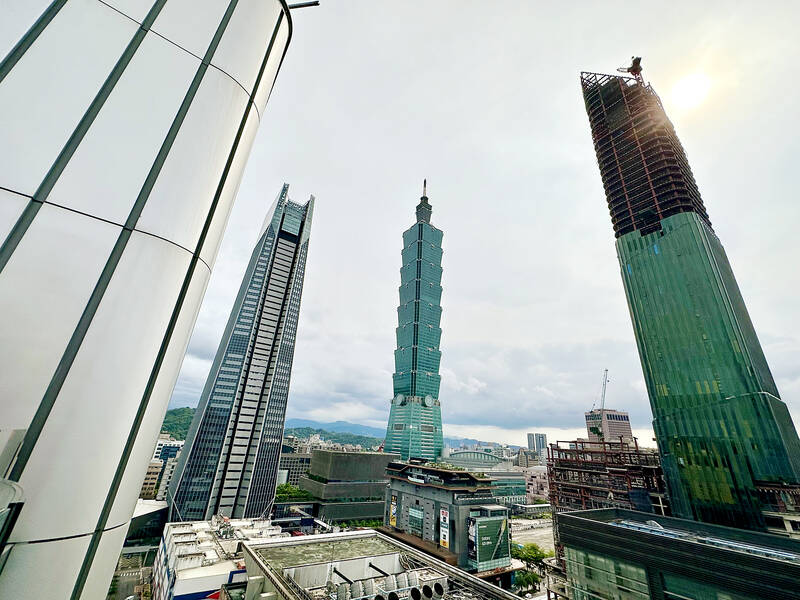The central bank’s new credit controls on second-home loans would have a very limited impact on the property market, as local banks generally adopt a cautious approach in dealing with mortgages in light of a weak economy, analysts said.
Moreover, most homeowners likely breathed a sigh of relief after the central bank on Thursday kept interest rates intact, as the previous five rate hikes have raised the mortgage burden to a 14-year high and cooled buying interest, Sinyi Realty Inc (信義房屋) said.
Mortgage rates have gained a cumulative 0.75 percentage points to 2.08 percent — rising above the 2 percent mark for the first time since January 2009 — implying an additional NT$70 billion (US$2.28 billion) in interest expenses as mortgages hit NT$9.4 trillion in April, Sinyi research manager Tseng Ching-der (曾敬德) said.

Photo: Hsu Yi-ping, Taipei Times
The pinch is especially evident for people who bought homes in the past three years, when housing prices spiked across Taiwan on the back of a robust economy and capacity expansions by major tech firms, Tseng said.
Property transactions started to soften in the second half of last year, dampened by interest rate hikes, an economic slowdown and unfavorable policy measures to curb property prices, he said.
Prospective buyers are likely to remain cautious after the central bank renewed credit controls by cutting the loan-to-value ratio from 75 to 70 percent on second-home mortgages in Taipei, New Taipei City, Taoyuan, Taichung, Tainan, Kaohsiung, and Hsinchu city and county, the analyst said.
The eight areas account for up to 80 percent of property transactions nationwide, he said.
The central bank aimed to send a message that “it cares” after putting policy rates on hold, in line with the US Federal Reserve, Tseng said.
Eastern Realty Co (東森房屋) said that the tighter lending terms, while unexpected, are reasonable as housing loans continue to rise despite shrinking transaction volumes.
In particular, second-home mortgages have grown unabated, the central bank said, adding that it is seeking to prevent funds from overflowing to real-estate properties and posing a threat to the financial system’s stability.
Eastern Realty said the lower loan-to-value cap would affect home buyers with relocation needs.
This group will have to set aside more money for down payments when switching houses, the broker said.
State-run Taiwan Cooperative Financial Holding Co (合庫金控) dismissed the worries, saying that lenders have by and large turned conservative about second-home mortgages.
Present loan-to-value ratios stand at 70 percent on average for second homes, the nation’s major mortgage lender said, adding that banks could show flexibility for people with relocation needs.

Taiwan will prioritize the development of silicon photonics by taking advantage of its strength in the semiconductor industry to build another shield to protect the local economy, National Development Council (NDC) Minister Paul Liu (劉鏡清) said yesterday. Speaking at a meeting of the legislature’s Economics Committee, Liu said Taiwan already has the artificial intelligence (AI) industry as a shield, after the semiconductor industry, to safeguard the country, and is looking at new unique fields to build more economic shields. While Taiwan will further strengthen its existing shields, over the longer term, the country is determined to focus on such potential segments as

UNCERTAINTY: Innolux activated a stringent supply chain management mechanism, as it did during the COVID-19 pandemic, to ensure optimal inventory levels for customers Flat-panel display makers AUO Corp (友達) and Innolux Corp (群創) yesterday said that about 12 to 20 percent of their display business is at risk of potential US tariffs and that they would relocate production or shipment destinations to mitigate the levies’ effects. US tariffs would have a direct impact of US$200 million on AUO’s revenue, company chairman Paul Peng (彭雙浪) told reporters on the sidelines of the Touch Taiwan trade show in Taipei yesterday. That would make up about 12 percent of the company’s overall revenue. To cope with the tariff uncertainty, AUO plans to allocate its production to manufacturing facilities in

COLLABORATION: Given Taiwan’s key position in global supply chains, the US firm is discussing strategies with local partners and clients to deal with global uncertainties Advanced Micro Devices Inc (AMD) yesterday said it is meeting with local ecosystem partners, including Taiwan Semiconductor Manufacturing Co (TSMC, 台積電), to discuss strategies, including long-term manufacturing, to navigate uncertainties such as US tariffs, as Taiwan occupies an important position in global supply chains. AMD chief executive officer Lisa Su (蘇姿丰) told reporters that Taiwan is an important part of the chip designer’s ecosystem and she is discussing with partners and customers in Taiwan to forge strong collaborations on different areas during this critical period. AMD has just become the first artificial-intelligence (AI) server chip customer of TSMC to utilize its advanced

While China’s leaders use their economic and political might to fight US President Donald Trump’s trade war “to the end,” its army of social media soldiers are embarking on a more humorous campaign online. Trump’s tariff blitz has seen Washington and Beijing impose eye-watering duties on imports from the other, fanning a standoff between the economic superpowers that has sparked global recession fears and sent markets into a tailspin. Trump says his policy is a response to years of being “ripped off” by other countries and aims to bring manufacturing to the US, forcing companies to employ US workers. However, China’s online warriors